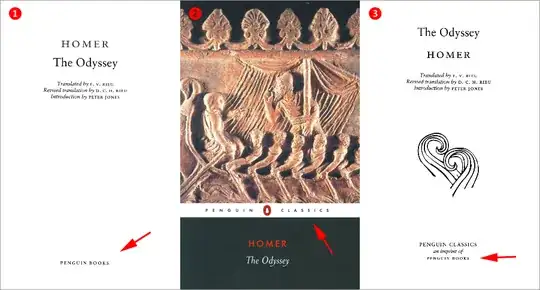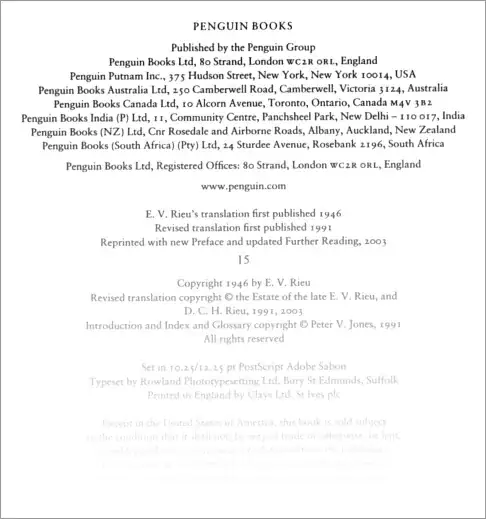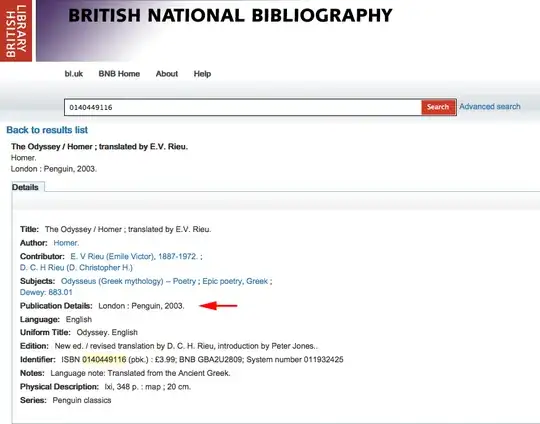Unfortunately you don't explain what you need to identify the publisher for.
If you want to quote a source in a text that you write, the first place to look for information about the publisher is the title page, the top of which lists the author and book title, and the bottom of which usually lists the publisher and place, sometimes the year, of publication.
Here is the title page (1) of the Penguin Classics paperback edition of Rieu's translation of Homer's Odyssey which names "Penguin Books" as publisher:

As you can see from the book cover (2), this edition of Homer's Odyssey was published in Penguin Classics. So why is the publisher not given as "Penguin Classics"? As the hardcover edition of the same book states (3), "Penguin Classics is an imprint of Penguin Books". Penguin Books is the publisher of that imprint, and consequently of that imprint's books.
Note that in your example, the copyright page reads:
First published in Great Britain by William Heinemann Ltd 1968
but:
Published in Penguin Classics 2011
So Heinemann ("by") was the publisher of the first edition, while Penguin Classics ("in") is the imprint of the present edition. The publisher is, in Penguin books, also given at the very top of the copyright page, in capital letters.
Here is the copyright page for the Penguin Classics edition of Homer's Odyssey, and again you can see that the publisher is "Penguin Books":

Oops, but doesn't your copyright page read "PENGUIN CLASSICS"? So was my Homer published by Penguin Books and in Penguin Classics, but your book – John Le Carré, A Small Town in Germany, if I'm not mistaken – both by and in Penguin Classics?
I'm confused.
As we know, Penguin Books was an independent publisher, but later became an imprint of first Penguin Group and currently Penguin Random House. Maybe the change of the status of Penguin Books from a publisher to an imprint has something to do with different publishers being associated with different publications in the Penguin Classics imprint? I don't know.
There are books, the copyright page of which is simple and straightforward; and there are books, the copyright page of which is a subject for advanced library science.
What I do, in cases like this, is I let expert librarians answer your question for me: I use the British National Bibliography. Searching for this book by ISBN turns up the following information:

As you can see, the British National Bibliography gives "Penguin" as the publisher of this book. And if that is what the British Library does, then this is good enough for me. In a bibliography in a paper of mine, I would list this book in the following way (in APA style):
Homer. (2003). The Odyssey (trans. E. V. Rieu). London: Penguin.
Other countries have their own national libraries, and if in doubt, I would always consult their records.
For older books not listed in the national bibliography, and for books whose country of origin you are unsure of, consult a bibliography of the relevant scholarly discipline (i.e. a database listing publications in the field of history, medicine, or whatever the book is about).
In short:
- look at the title page, if information is incomplete:
- look at the copyright page, if that is confusing:
- look in a relevant database or bibliography
What I never do is trust the "Cite" feature of Google Scholar. The information given there is very often incomplete or formatted falsely. But Google Scholar can help you identify other publication quoting your book, and you can get a first idea of how it might be correctly quoted, or what discipline it belongs to, so that you can identify a relevant database.
If, on the other hand, you need to contact the publisher, any of the addresses given will be fine. Depending on what you want from them, you might speed up turnaround time by identifying the relevant person or office through their web page, but if you send a letter to any of the addresses given on the copyright page, it should, with luck, eventually reach its destination also.


